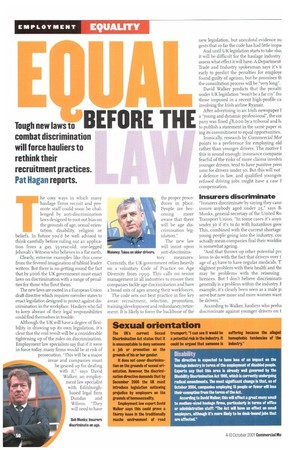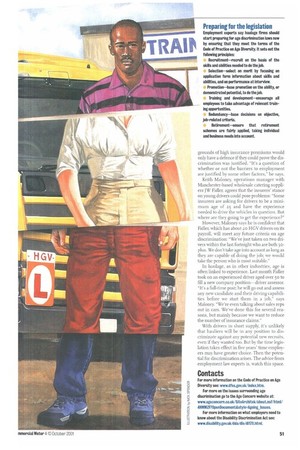Tough new laws to BEFORE T
Page 50

Page 51

If you've noticed an error in this article please click here to report it so we can fix it.
combat discrimination will force hauliers to rethink their recruitment practices.
Pat Hagan reports.
he cosy ways in which many haulage firms recruit and promote staff could soon be challenged by anti-discrimination laws designed to root out bias on the grounds of age, sexual orientation, disability, religion or beliefs. In future you'd be well advised to think carefully before ruling out an application from a gay, 55-year-old, one-legged Jehovah's Witness who believes in a flat earth.
Clearly, extreme examples like this come from the fevered imagination of tabloid leader writers. But there is no getting round the fact that by 2006 the UK government must enact laws on discrimination with a range of penalties for those who flout them.
The new laws are rooted in a European Union draft directive which requires member states to enact legislation designed to protect against discrimination in the workplace. Hauliers who fail to keep abreast of their legal responsibilities could find themselves in trouble.
Although the UK will have a degree of flexibility in drawing up its own legislation, it's clear that the end result will be a considerable tightening up of the rules on discrimination. Employment law specialists say that if it were in force today, many firms would be at risk of prosecution. "This will be a major issue and companies must be geared up for dealing with it," says David Walker, an employment law specialist with Edinburghbased legal firm Dundas and Wilson. "They will need to have the proper procedures in place. People are bec oming more aware that there will be age discrimination legislation."
The new law will insist upon Maloney: Takes on older drivers, anti-discrimina
tory measures. Currently, the UK government relies heavily on a voluntary Code of Practice on Age Diversity from 1999. This calls on senior management in all industries to ensure their companies tackle age discrimination and have a broad mix of ages among their workforces.
The code sets out best practice in five key areas: recruitment, selection, promotion, training/development and redundancy/retirement. It is likely to form the backbone of the new legislation, but anecdotal evidence su gests that so far the code has had little impao And until UK legislation starts to take shai it will be difficult for the haulage industry assess what effect it will have. A Department Trade and Industry spokesman says it's t( early to predict the penalties for employe found guilty of ageism, but he promises th the consultation process will be "very long".
David Walker predicts that the penalti under UK legislation "won't be a far cry" fro those imposed in a recent high-profile ca involving the Irish airline Ryanair.
After advertising in an Irish newspaper f a "young and dynamic professional", the cot party was fined £8,000 by a tribunal and h to publish a statement in the same paper st ing its commitment to equal opportunities.
Ironically, research by Commercial Mot points to a preference for employing old rather than younger drivers. The motive f this is sound enough: insurance companif fearful of the risks of more claims involvir younger drivers, tend to have punitive pren urns for drivers under 3o. But this will not " a defence in law, and qualified youngste refused driving jobs might have a case f compensation.
Insurers discriminate
"Insurers discriminate by saying they cane insure anybody aged under 25," says SI Monks, general secretary of the United Rch Transport Union. "In some cases it's anyol under 30 if it's to do with hazardous gooc This, combined with the current shortage young people going into the industry, cot: actually mean companies find their woricfor is somewhat ageing.
"And that throws up other potential prc lerns to do with the fact that drivers over t" age 0145 have to have regular medicals. T slightest problem with their health and thc may be problems with the reissuing licences. But I don't believe discriminati, generally is a problem within the industry. F example, it's clearly been seen as a male Fe serve but now more and more women want be drivers."
According to Walker, hauliers who perha discriminate against younger drivers on t grounds of high insurance premiums would only have a defence if they could prove the discrimination was justified. "It's a question of whether or not the barriers to employment are justified by some other factors," he says.
Keith Maloney, operations manager with Manchester-based wholesale catering suppliers JW Fidler, agrees that the insurers' stance on young drivers could pose problems: "Some insurers are asking for drivers to be a minimum age of 25 and have the experience needed to drive the vehicles in question. But where are they going to get the experience?"
However, Maloney says he is confident that Fidler, which has about 20 H CV drivers on its payroll, will meet any future criteria on age discrimination: "We've just taken on two drivers within the last fortnight who are both 50plus. We don't take age into account as long as they are capable of doing the job; we would take the person who is most suitable."
In haulage, as in other industries, age is often linked to experience. Last month Fidler took on an experienced driver aged over 50 to fill a new company position—driver assessor. "It's a full-time post; he will go out and assess any new candidate and their driving capabilities before we start them in a job," says Maloney. "We're even talking about sales reps out in cars. We've done this for several reasons, but mainly because we want to reduce the number of insurance claims."
With drivers in short supply, it's unlikely that hauliers will be in any position to discriminate against any potential new recruits, even if they wanted too. But by the time legislation takes effect in five years' time employers may have greater choice. Then the potential for discrimination arises. The advice from employment law experts is, watch this space.
Contacts
For more information on the Code of Practice on Age Diversity see: vAvw.dfes.gov.uk/index.htm.
For more on the issues surrounding age discrimination go to the Ago Concern wohsite at: www.agoconcern.co.uk/SiteArchitekAhout.nsf/html/ 4HMMZFPOpenDocument&style=Ageing_Issues.
For more information on what employers need to know about the Disability Discrimination Act see: www.disahility.gov.uk,4lda/dle/d1170.html.
















































































































































